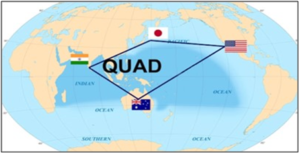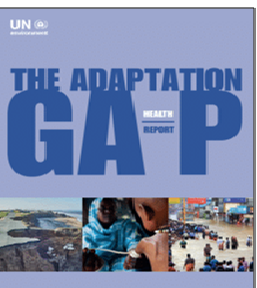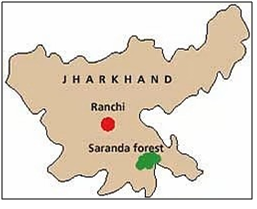Archives
(PRELIMS Focus)
Category: International Relations
Context:
- The summit between U.S. President and Chinese President in Busan, South Korea, ended with several outcomes for bilateral ties between the two countries and may also impact India and Quad.

About Quad:
- Members: QUAD, also known as the Quadrilateral Security Dialogue is a strategic forum comprising four countries: the United States, Japan, India, and Australia.
- Objective: The Quad is aimed at promoting regional security and economic cooperation in the Indo-Pacific region.
- Not a formal grouping: The Quad is a loose grouping rather than a formal alliance. It does not have a decision-making body or a secretariat, or a formal structure like NATO or the United Nations. The alliance is maintained through summits, meetings, information exchanges, and military drills.
- Revolves around Indo-Pacific region: The four countries share a common interest in maintaining a free and open Indo-Pacific, promoting democracy, human rights, and the rule of law, and countering China’s expanding influence in the region.
- Counters influence of China: The Quad is seen as a mechanism for balancing China’s influence in the region (through ‘String of pearls’ theory), although its members have stressed that it is not a military alliance and is open to other countries who share their values and interests.
- Other focus areas: The QUAD aims to promote people-to-people ties through academic and cultural exchanges and enhance disaster relief and humanitarian assistance capabilities. It also resolves debt issues under the G20 Common Framework through the ‘Quad Debt Management Resource Portal.’
- Evolution:
- 2007: The Quad was initially formed in 2007 during an informal meeting of leaders from the Association of Southeast Asian Nations (ASEAN). It was Japanese Prime Minister Shinzo Abe who first proposed the idea of creating the Quad.
- 2012: The Japanese Prime Minister highlighted the concept of the ‘Democratic Security Diamond’ in Asia, which includes the US, Japan, India, and Australia.
- 2017: Once again confronted with the growing danger posed by China, the four nations revitalized the Quad by expanding its goals and devising a system that aimed to gradually establish an international order based on rules. India, Japan, USA, and Australia held the first ‘Quad’ talks in Manila ahead of the ASEAN Summit 2017.
Source:
Category: Miscellaneous
Context:
- Amid rising global temperatures, UNEP’s 2025 Adaptation Gap Report: Running on Empty finds that a yawning gap in adaptation finance for developing countries is putting lives, livelihoods and entire economies at risk.

About Adaptation Gap Report:
- Published By: It is an annual flagship publication of the United Nations Environment Programme (UNEP) –Copenhagen Climate Centre with contributions from multiple global institutions and experts.
- Objective: The Adaptation Gap Report tracks global progress on climate adaptation planning, implementation, and finance, assessing how far the world is from achieving climate resilience goals.
- Focus on developing countries: To evaluate whether nations—especially developing ones—are adapting fast enough to climate impacts, and to quantify the adaptation finance gap to support global negotiations under the UNFCCC and COP30.
- Important highlights from Adaptation Gap Report 2025:
- The report updates the cost of adaptation finance needed in developing countries, putting it at US$310 billion per year in 2035, when based on modelled costs.
- When based on extrapolated needs expressed in Nationally Determined Contributions and National Adaptation Plans, this figure rises to US$365 billion a year.
- Meanwhile, international public adaptation finance flows to developing countries were US$26 billion in 2023: down from US$28 billion the previous year. This makes adaptation financing needs in developing countries 12-14 times as much as current flows.
- If current finance trends continue, the Glasgow Climate Pact goal of doubling international public adaptation finance from 2019 levels by 2025 will not be achieved, while the New Collective Quantified Goal for climate finance is not ambitious enough to close the finance gap.
- The private sector could do more – with potential to provide around US$50 billion per year if backed by targeted policy action and blended finance solutions.
Source:
Category: Government Schemes
Context:
- India is set to launch it’s first-ever cooperative cab service “Bharat Taxi” in November 2025 in Delhi and it aims to address challenges faced by both commuters and drivers using private cab services.

About Bharat Taxi:
- Launched by: It is launched by Union Ministry of Cooperation and the National e-Governance Division (NeGD).
- Objective: It aims to build a robust, fairer system settling growing urban cab facility needs in the country.
- Based on cooperative model: This cooperative cab service offers a transparent, driver-owned alternative to private aggregators where drivers become members and shareholders instead only as ’employees’.
- One stop solution for passengers and drivers: Bharat Taxi is expected to be as a materialistic solution for the long-standing challenges faced by both commuters and drivers using private cab services. The model ensures all the stakeholders including the driver, the passenger behind the wheels have a voice in the system.
- Integration with other government services: The platform integrates with government digital services like DigiLocker and UMANG, ensuring seamless verification and service access.
- Management: Sahakar Taxi Cooperative Limited manages Bharat Taxi comprising cooperative leaders and driver representatives. It is backed by eight major institutions, renowned for its strong governance, transparency, and long-term sustainability for the initiative.
Source:
Category: Environment and Ecology
Context:
- The Supreme Court reserved its verdict on the Jharkhand government’s plea to reduce the expanse of to be notified Saranda sanctuary from its earlier 310 sq km to 250 sq km to exclude 60 sq km of forest inhabited by tribals to protect their forest rights.

About Saranda Sanctuary:
- Location: It is a proposed wildlife sanctuary in West Singhbhum district of Jharkhand, located within the Saranda Forest Division, known as one of Asia’s largest Sal (Shorea robusta) forests and a key biodiversity hotspot at the Jharkhand–Odisha border.
- Nomenclature: Situated in southern Jharkhand, the Saranda region—means “land of seven hundred hills.”
- Area: It covers about 856 sq km, of which 816 sq km is reserved forest.
- Ecological corridor between several states: It lies within the Singhbhum Elephant Reserve, forming a vital ecological corridor between Jharkhand, Odisha, and Chhattisgarh.
- Evolution: It was declared a game reserve in 1968 under the Bihar Forest Act. The National Green Tribunal (2022) directed Jharkhand to notify it as a sanctuary under the Wildlife Protection Act, 1972.
- Flora: Dense cover of Sal, Kusum, Mahua, and rare orchids are found here.
- Fauna: It forms an important habitat for Asian elephants, four-horned antelope, sloth bears, flying lizards, and migratory birds.
- Important Communities: It is home to Ho, Munda, Oraon, and several PVTGs, reliant on forest produce like mahua and resin.
- Mineral resources: It contains nearly 26% of India’s iron ore reserves, making it a major mining zone for SAIL and private operators.
Source:
Category: Government Schemes
Context:
- In a significant step toward digital transformation, the Union Minister of Coal and Mines launched two transformative digital platforms the KOYLA SHAKTI Dashboard and the Coal Land Acquisition, Management, Portal (CLAMP) at New Delhi.

About Koyla Shakti Dashboard:
- Nature: The Koyla Shakti Dashboard is a pioneering digital platform that integrates the entire coal value chain from mine to market on a unified interface.
- Development: Developed by the Ministry of Coal, the Koyla Shakti – Smart Coal Analytics Dashboard (SCAD) serves as a centralized digital platform integrating data from multiple stakeholders.
- Objective: The primary objective of Koyla Shakti is to strengthen operational efficiency, promote transparency, and enhance coordination across the coal supply chain.
- Provides real-time coordination: The platform facilitates real-time coordination among coal companies, railways, ports, and end users, thereby enhancing operational efficiency and ensuring seamless coal logistics.
- Data-driven governance: As a comprehensive decision-support system, Koyla Shakti enables data-driven governance, optimizes resource allocation, and strengthens supply chain management.
- In line with Aatmanirbhar Bharat: This initiative underscores the Ministry’s commitment to transparency, efficiency, and technological innovation, in line with the Government’s vision of Aatmanirbhar Bharat and Minimum Government, Maximum Governance.
About CLAMP Portal:
- Nature: The Coal Land Acquisition, Management, Portal (CLAMP) is a unified digital solution for the coal sector.
- Objective: It is aimed at streamlining land acquisition, compensation, and rehabilitation & resettlement (R&R) processes in the coal sector.
- Centralised depository: Serving as a centralized repository of land records, the portal ensures data integration, enhances accountability, and minimizes procedural delays.
- Step towards transparency: By digitizing the complete workflow from uploading land details to payment of compensation, CLAMP enhances transparency, efficiency, and inter-agency coordination in land management practices across coal PSUs.
Source:
(MAINS Focus)
(GS Paper 2: Issues Relating to Education; GS Paper 3: Science and Technology – Developments and their Applications)
Context( Introduction)
The Ministry of Education’s proposal to introduce an Artificial Intelligence (AI) curriculum from Class 3 onwards, along with the ‘Skilling for AI Readiness’ initiative, has sparked debate over India’s readiness, infrastructure, and educational priorities in integrating AI at the school level.
Main Arguments in Favour
- AI Literacy vs. AI Skills: A phased approach is being designed — early grades (Classes 3–8) focus on AI literacy (understanding concepts, ethics, responsible use), while senior grades (Classes 9–12) focus on AI skills such as coding, Python, and data analytics.
- Future Workforce Readiness: Early exposure prepares students for automation-driven job markets, supporting initiatives like Digital India and Skill India.
- Enhancing Critical Thinking: Integrating AI at foundational stages can strengthen analytical reasoning, creativity, and problem-solving skills among children.
- Evolving Pedagogy: Education must shift from rote learning and cognitive models to constructivist and experiential learning, making technology native to classrooms.
- Global Alignment: Countries such as Finland, Singapore, and the U.S. have successfully included AI ethics and digital education, showing that responsible introduction is possible and beneficial.
Criticisms and Drawbacks
- Rapid Technological Change: AI technologies evolve faster than curriculum design, risking obsolescence (e.g., prompt engineering may soon disappear).
- Digital and Language Divide: Over 50% of schools lack digital infrastructure, and AI tools in regional languages remain limited, creating inequity.
- Risk of “Dis-Education”: Overdependence on AI-generated responses may reduce students’ motivation to learn and think critically.
- Teacher Preparedness: About 9% of schools have only one teacher, and half lack full qualifications. Without AI literacy and training, implementation may fail.
- Ethical and Psychological Concerns: Children may overshare personal information with chatbots or develop dependency, risking data misuse and psychological issues.
- Infrastructure Gaps: Schools without electricity or internet connectivity cannot realistically deliver AI-based lessons, widening the urban-rural divide.
Reforms and Recommendations
- Phased and Contextual Introduction:
- Primary Level (Classes 3–5): Focus on AI awareness and ethical understanding using simple, real-life examples.
- Middle Level (Classes 6–8): Introduce hands-on, unplugged projects to develop critical thinking and ethical AI use.
- Secondary Level (Classes 9–12): Teach AI applications, programming, NLP, and data analytics to build professional skills.
- Teacher Capacity Building:
- Conduct in-service AI training, develop open-source AI teaching toolkits, and integrate pedagogical support systems.
- Inclusive Digital Infrastructure:
- Expand PM eVidya and National Digital Education Architecture (NDEAR) to provide AI learning access to rural and government schools.
- Child Safety and Data Protection:
- Enforce age-appropriate AI design codes, strict privacy rules, and data guardrails to ensure ethical AI interaction.
- Localization and Accessibility:
- Collaborate with Bhashini Mission and other initiatives to develop multilingual AI tools for diverse learners.
- Ethical AI Education:
- Integrate AI ethics, fairness, and accountability modules, in line with NEP 2020’s vision for value-based and experiential learning.
- Continuous Curriculum Review:
- Establish an AI in Education Council to periodically revise and update the syllabus based on technological developments.
Conclusion
Introducing AI education is not merely about producing coders or engineers, but about nurturing critical thinkers capable of using technology wisely and ethically. With a phased, inclusive, and ethically grounded approach, India can cultivate an AI-ready generation that combines innovation with responsibility to shape a technologically empowered yet human-centered future.
Mains Question
- “Introducing AI education from the primary level can democratize future opportunities but risks deepening digital inequality.” Discuss in the context of India’s education system and NEP 2020. (250 words, 15 marks)
Source: The Hindu
(GS Paper 4: Ethics in Journalism and Public Service)
Context ( Introduction)
The devastating North Bengal floods (2025), which claimed over 30 lives and caused 110 major landslides, highlight not only the tragedy of natural disasters but also the ethical dilemmas and moral responsibilities faced by journalists covering human suffering in crisis situations.
Core Ethical Principles in Disaster Journalism
- Empathy Over Exploitation: Reporting on trauma demands sensitivity. Journalists must avoid intrusive questioning or emotional exploitation of survivors for “scoops.” The dignity of victims should remain central, ensuring that storytelling does not become voyeuristic.
- Humanity and Compassion: Despite losing everything, many survivors displayed kindness and solidarity. Ethical journalism reciprocates that humanity — acknowledging resilience rather than only amplifying grief.
- Informed Consent: Victims are not obligated to share their pain. Ethical conduct requires seeking informed consent before interviews or photographs, especially when individuals are in psychological distress.
- Sensitivity to Visual Representation: Ethical journalists must be cautious with graphic imagery — ensuring that visuals evoke empathy and awareness, not sensationalism. Visuals should preserve privacy, cultural values, and emotional limits of affected communities.
- Objectivity with Compassion:
Balancing truth-telling with emotional restraint is vital. Facts must be accurate, but the tone should remain compassionate, avoiding blame narratives or politicization during humanitarian crises. - Cultural and Contextual Respect: Disaster zones often overlap with tribal, border, or minority communities. Ethical reporting means understanding local sensitivities, avoiding stereotypes, and ensuring representation of marginalized voices.
- Avoiding Harm and Re-traumatization: Journalists must recognize psychological limits — identifying visual cues and body language to know when to stop questioning. Ethical restraint protects both reporter and survivor from further trauma.
Ethical Challenges in the Field
- Access and Safety vs. Duty to Inform: Reporters often risk personal safety in unstable terrain to bring stories from remote, high-risk zones. Balancing public interest with personal responsibility is a recurring ethical dilemma.
- Media Absence in Marginal Areas: Many border or high-altitude communities go unreported due to bureaucratic hurdles or fear of reprisal. This reflects a failure in media justice, where certain lives remain invisible in national narratives.
- Economic and Institutional Pressures: The demand for “impactful stories” may tempt sensationalism. Ethical journalism must resist commercial pressure and focus on truthful, human-centered reporting.
- Reporter’s Emotional Trauma: Covering destruction and death leads to vicarious trauma. Ethical frameworks should extend to journalist well-being, promoting mental health support and peer debriefing mechanisms post coverage.
Reforms and Best Practices
- Adopt Ethical Codes: Implement the Press Council of India’s Guidelines on Disaster Coverage, emphasizing accuracy, restraint, and empathy.
- Capacity Building: Train journalists in psychological first aid, trauma-informed reporting, and ethical interviewing techniques.
- Community-Centric Reporting: Shift focus from event-driven to people-centric journalism — highlighting resilience, recovery, and lessons learned.
- Collaborative Reporting: Encourage partnerships with local reporters, NGOs, and disaster authorities to ensure authentic, safe, and holistic coverage.
- Institutional Support Systems: Establish media ethics cells within news organizations for ethical review of sensitive reports and visuals.
- Ethical Tech Use: Use AI verification tools to combat misinformation, but ensure data privacy and contextual accuracy in disaster-related visuals or stories.
Conclusion
Ethical disaster journalism is not just about telling stories of pain, but about restoring dignity to those who suffer. By upholding empathy, truth, and responsibility, journalists transform from mere observers to agents of human solidarity and accountability. Amid ruins, it is not just infrastructure that needs rebuilding — it is trust and humanity.
Mains Question
“Disaster reporting requires empathy as much as accuracy.” In the context of increasing natural calamities in India, discuss the ethical responsibilities of journalists in balancing truth-telling and human dignity. (150 words, 10 marks)
Source: The Hindu
(GS Paper 1 – Modern Indian History –“Post-independence consolidation and reorganisation within the country.”)
Introduction
At the time of independence in 1947, India faced daunting challenges — partition, communal tensions, economic backwardness, weak institutions, and social fragmentation. The foremost task before the new leadership was to ensure political consolidation and national unity in a diverse and divided nation.
- Framing a Sovereign and Democratic Constitution
- The making of the Constitution (1946–49) provided the foundation for a sovereign, democratic, and republican polity.
- The Constituent Assembly, partly elected and partly nominated under the Cabinet Mission Plan, reflected India’s plural diversity.
- Under B.R. Ambedkar’s chairmanship, the Constitution was adopted on November 26, 1949 and came into effect on January 26, 1950.
- It guaranteed Fundamental Rights, Directive Principles, and a federal structure with a strong centre, ensuring unity amidst diversity.
- The Constitution became the moral and institutional anchor of India’s political consolidation.
- Integration of Princely States
- After independence, over 500 princely states existed outside direct British India. Their integration was vital for territorial unity.
- Sardar Vallabhbhai Patel and V.P. Menon led this process through diplomacy, persuasion, and strategic firmness.
- Most rulers acceded to India by August 15, 1947, except Hyderabad, Junagadh, and Jammu & Kashmir — each integrated through plebiscite, military action, or accession.
- Later, Pondicherry (1954) and Goa (1961) completed India’s territorial consolidation.
- Patel’s statesmanship earned him the title “Iron Man of India”, symbolising unity through pragmatic nationalism.
- Linguistic Reorganisation and Federal Balance
- The early leadership postponed linguistic reorganisation fearing disintegration.
- The death of Potti Sriramalu (1952) during his fast for a Telugu-speaking state compelled the formation of Andhra Pradesh.
- The States Reorganisation Act, 1956, based on the Fazl Ali Commission, created 14 States and 6 Union Territories.
- It rationalised the political map and reduced regional discontent, preserving national unity through federal accommodation.
- As Rajni Kothari observed, it strengthened rather than weakened the Indian Union.
- Reforming Education and Human Capital
- Colonial education was elitist, clerical, and divorced from India’s needs.
- Post-independence reforms sought to create a mass-based, scientific, and egalitarian education system.
- University Education Commission (1948–49) under S. Radhakrishnan called for a comprehensive university reform.
- Mudaliar Commission (1952) emphasised secondary education and vocational skills.
- Establishment of UGC (1953) and IITs (from 1950 onwards) laid the foundation of higher and technical education to build a modern nation.
- Article 45 of the Constitution mandated free and compulsory education up to 14 years, marking a shift toward inclusive development.
- Shaping an Independent Foreign Policy
- India’s external outlook was guided by anti-colonialism, non-alignment, and peaceful coexistence.
- Drawing from the Congress’s 1921 resolution and Nehru’s vision, India aimed for strategic autonomy in global affairs.
- The Panchsheel Agreement (1954) embodied principles of mutual respect, non-aggression, and peaceful coexistence.
- Through Afro-Asian solidarity and the Non-Aligned Movement (NAM), India projected itself as a moral and independent voice of the developing world.
- Article 51 of the Constitution directed the State to promote peace, disarmament, and international cooperation.
- Overcoming Challenges of Nation-Building
- The new nation had to navigate partition violence, refugee influx, food scarcity, and linguistic diversity.
- Leadership under Nehru, Patel, and Ambedkar maintained constitutional democracy when many post-colonial states drifted to authoritarianism.
- Democratic elections, free press, and secular governance became instruments of unity through participation.
- The emphasis on planning, education, and institutional building provided stability during formative years.
Conclusion
India’s early decades were marked by visionary leadership, inclusive constitutionalism, and pragmatic statecraft.
- The synthesis of unity with diversity, achieved through constitutional democracy, federal reorganisation, educational reform, and non-aligned diplomacy, ensured that the Indian nation not only survived but evolved into the world’s largest and most resilient democracy.
- The ongoing challenge remains to deepen this unity through social justice, participatory governance, and cooperative federalism — the true spirit of India’s freedom.
Mains Question
- “Political consolidation and national unity in post-independence India were achieved not merely through political integration, but through visionary constitutionalism and inclusive state-building.” Discuss. (250 words, 15 marks)
Source: The Indian Express
